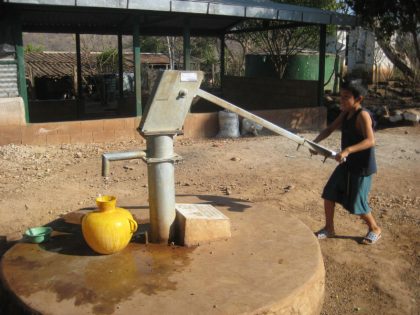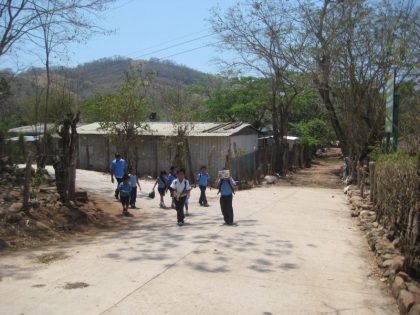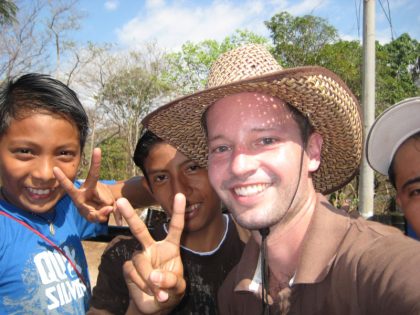 Location
Location
Caserío El Tular, Cantón Apancoyo Arriba, Municipio de Cuisnahuat,
Departamento de Sonsonate, El Salvador
Community Description
Caserío El Tular is located in the municipality of Cuisnahuat, in the southern region of the department of Sonsonate. Cuisnahuat is ranked as the 3rd poorest municipality in El Salvador and has been designated a municipality of ¨extrema pobreza.¨ El Tular is located approximately 4 kilometers from the Litoral Highway. El Tular has 203 families with just over 1,000 residents, according to a recent census. Approximately one-third of the population is under 10 years old.
The vast majority of residents in El Tular are agricultural laborers. The principal crops include corn, beans, and sugar cane. El Tular has one public school that goes up to tercer ciclo (9th grade). Because the nearest high school is located about 2 kilometers from El Tular, most of the female students do not go on to complete high school. While many male students do go on to get their high school diplomas, the vast majority have trouble finding employment outside of the community.
 One of the main health problems facing the community is stomach illnesses produced by parasites and amoebas due to a lack of clean drinking water. The vast majority of residents haul water from natural springs located near the two rivers that run through the community. Because these springs are contaminated, all residents are advised to treat their water with PuriAgua, a chlorine substance. Many residents neglect to do this.
One of the main health problems facing the community is stomach illnesses produced by parasites and amoebas due to a lack of clean drinking water. The vast majority of residents haul water from natural springs located near the two rivers that run through the community. Because these springs are contaminated, all residents are advised to treat their water with PuriAgua, a chlorine substance. Many residents neglect to do this.
Two months ago, an NGO came to the community and installed 3 hand-pump wells that produce cleaner water than the natural springs. There are now 4 wells in El Tular. It is estimated that 120 families use these wells.
Unfortunately, just a few weeks after the wells were installed, one of them broke, causing residents to return to the use of the natural spring water near the rivers. The well was broken for about a month before it was fixed by the NGO.
 Because the wells are used heavily every day from 5 AM to 9 PM, the likelihood of a well malfunctioning is very high. When a well breaks, residents use the natural springs, putting themselves and their families at a higher risk of contracting a water-borne illness.
Because the wells are used heavily every day from 5 AM to 9 PM, the likelihood of a well malfunctioning is very high. When a well breaks, residents use the natural springs, putting themselves and their families at a higher risk of contracting a water-borne illness.
Project Description
This project is to purchase the tools and materials necessary to repair the wells in the community when they break.
In addition, 8 men from the community will be trained in how to fix wells. The NGO, working with the Water Committee, has identified the tools and materials necessary, and will provide the training at no cost to the project.
As a result of the project, community members will be able to fix broken wells immediately, thus contributing to the improvement of the health of the residents.
Project Impact
Approximately 120 families, consisting of over 700 people, will benefit from this project.
Peace Corps Volunteer Directing Project
Benjamin Byers
Comments
This is an extraordinary project, and the first one of its type in which we have taken part. It represents the ultimate in sustainability: Community workers are trained to do repairs, and tools and parts are made available. It takes away the reliance on outsiders, and allows the village to take control of its own welfare.
Water Charity remains true to its mission, which involves only doing projects on the ground. The training is being done by others, and our project funds are being used only for tools and hardware.
Dollar Amount of Project
$500.00
Donations Collected to Date
$500.00
Dollar Amount Needed
$0.00 – This project has now been fully funded, through the generosity of The Soneva SLOW LIFE Trust as a part of their Clean Water Projects initiative.
We encourage others to continue to donate using the Donate button below, and we will notify Peace Corps Volunteer Benjamin Byers of your donation. Additional funds will be used to fund the next project by Benjamin and/or those of his counterpart PCVs in El Salvador.
This project has been finished. To read about the conclusion of the project, CLICK HERE.